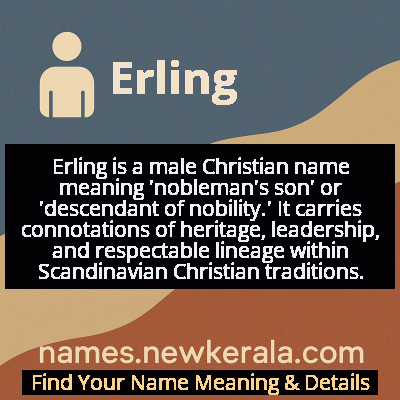Erling Name Meaning & Details
Origin, Popularity, Numerology Analysis & Name Meaning of Erling
Discover the origin, meaning, and cultural significance of the name ERLING. Delve into its historical roots and explore the lasting impact it has had on communities and traditions.
Name
Erling
Gender
Male
Origin
Christian
Lucky Number
2
Meaning of the Name - Erling
Erling is a male Christian name meaning 'nobleman's son' or 'descendant of nobility.' It carries connotations of heritage, leadership, and respectable lineage within Scandinavian Christian traditions.
Erling - Complete Numerology Analysis
Your Numerology Number
Based on Pythagorean Numerology System
Ruling Planet
Moon
Positive Nature
Diplomatic, friendly, artistic, empathetic.
Negative Traits
Over-sensitive, moody, indecisive, prone to self-pity.
Lucky Colours
Green, cream, white.
Lucky Days
Monday.
Lucky Stones
Pearl, moonstone.
Harmony Numbers
1, 3, 4.
Best Suited Professions
Diplomats, mediators, caregivers, artists.
What People Like About You
Cooperative spirit, friendliness, artistic talent.
Famous People Named Erling
Erling Haaland
Professional Footballer
Premier League Golden Boot winner and record-breaking goal scorer
Erling Persson
Businessman
Founder of H&M fashion retail empire
Erling Kagge
Explorer
First person to complete the Three Poles Challenge
Erling Stordahl
Singer and Activist
Founded Norwegian Association of the Blind and Visually Impaired
Name Variations & International Equivalents
Click on blue names to explore their detailed meanings. Gray names with will be available soon.
Cultural & Historical Significance
Extended Personality Analysis
People named Erling are typically perceived as strong, dependable individuals with natural leadership qualities that stem from the name's noble origins. They often exhibit a balanced combination of traditional values and modern adaptability, making them effective in both personal and professional settings. Erlings tend to be practical problem-solvers who approach challenges with determination and resilience, reflecting the Scandinavian cultural emphasis on perseverance. Their leadership style is usually collaborative rather than authoritarian, showing respect for others' opinions while maintaining clear direction. Many Erlings display quiet confidence, loyalty to their principles, and a strong sense of responsibility toward family and community. These traits make them reliable friends, dedicated family members, and respected colleagues who often become stabilizing influences in their social circles.
Modern Usage & Popularity
In contemporary naming practices, Erling maintains consistent popularity in Norway and other Scandinavian countries while remaining relatively uncommon internationally. The name has experienced renewed interest in recent years, partly driven by the global fame of Norwegian footballer Erling Haaland, which has introduced the name to wider audiences. While not ranking among the most popular names globally, it holds a stable position in Nordic naming charts and has seen slight increases in usage among people of Scandinavian descent living abroad. Modern parents choosing the name often appreciate its strong historical roots, Christian heritage, and distinctive Scandinavian character without being overly common. The name continues to be perceived as traditional yet distinctive, appealing to those seeking names with cultural depth and international recognition potential.
Symbolic & Spiritual Meanings
Symbolically, Erling represents inherited nobility, grounded leadership, and the continuity of family legacy across generations. The name embodies the concept that true nobility comes not from titles alone but from character, responsibility, and service to community. Metaphorically, it suggests a bridge between ancient warrior traditions and modern civic values, representing the evolution of leadership from martial prowess to community stewardship. The symbolic meaning also includes resilience and adaptation, reflecting how Scandinavian culture has maintained its identity while integrating Christian values. Erling symbolizes the idea that everyone has a heritage worth honoring and that leadership emerges naturally from capable individuals who respect their roots while moving forward progressively.

